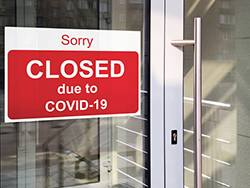 The Covid-19 pandemic has changed temporary working practices far beyond employees working from home, with centuries-old processes replaced almost overnight. But how will the lessons learned during lockdown shape our business, finance and legal sectors going forward?
The Covid-19 pandemic has changed temporary working practices far beyond employees working from home, with centuries-old processes replaced almost overnight. But how will the lessons learned during lockdown shape our business, finance and legal sectors going forward?
Nobody could have predicted at the turn of the year that, within a few months, most of the world would have put their societies – and in effect their economies – into lockdown.
The arrival of the Covid-19 pandemic has made that a reality and altered every part of our lives. It has brought with it numerous challenges – and the human and financial costs have been tragic and crippling. However, the coronavirus pandemic has also inspired great fortitude, generosity and innovation.
The NHS, for example, which has spent decades trying to overcome inefficiencies and archaic working practices, managed to turn a convention centre on the outskirts of London into a fully working hospital in just nine days.
Schools have pivoted to online learning, while legal institutions, including the Royal Court of Guernsey, have begun using video conferencing to carry out hearings that, for centuries, have been carried out largely in person.
Jersey’s and Guernsey’s business and finance sectors have also adapted their working practices.
So what has been done? And will these changes to working practices remain post-lockdown, or will we go back to the way we‘ve always done things?
Flexible benefits
The most talked-about change has been the need for staff to work from home. Most companies can share tales of setting up employees for instant remote access to servers, files and phone systems.
The experience of Matt Claxton, Global Head of Corporate Solutions at Apex Group in Jersey, is typical.
“We have 350 staff in Jersey and Guernsey carrying out fund administration, corporate services and private client work,” he explains. “In just a couple of weeks, well over 90% of our global staff began working from home.”
The move has been beneficial for staff – “giving them back time” and saving them the money previously spent commuting. “It’s enabling a more flexible way of working, for sure,” Claxton says.
Stuart Esslemont, Global Head of Legal and Compliance at Zedra, highlights positive staff feedback – and envisages more flexible working options post-pandemic. “It has benefited their personal lives and productivity,” he says.
“We are already considering whether it’s appropriate for us to have large offices in a number of jurisdictions. Do we need the footprint?”
 Virtual hearings and meetings
Virtual hearings and meetings
A notable characteristic of the new remote worker is the use of video communication apps and websites such as Zoom, Microsoft Teams and Skype.
“With the vast majority of our clients, we interact by telephone and email as we have a diverse base,” explains Claxton. “Although we still use those methods, I have been finding myself spending 10 hours a day on Microsoft Teams. It’s certainly accelerated their adoption within our business.”
Esslemont says these practices are likely to continue post-lockdown, given the efficiencies they have brought.
“We will reassess why we’ve been doing so much travelling when we return,” he says. “The main benefit from Zoom calls is that you can get yourself in front of more clients in a 24-hour period than you can do travelling.”
Technology has also improved interactions between staff. “I’m engaging a lot more on a regular basis with legal and compliance teams,” Esslemont says.
“People right across the business are having short, sharp regular meetings rather than the two to three-hour meetings you might have had in the office.”
There are limitations, however, to the future growth of virtual communications. Natasha Newell, Counsel at Carey Olsen in Guernsey, has been contacting her clients and offering advice on legal issues via video calls.
“It has worked because it’s needed to work. The fact that we can do this will lead to change in the post-coronavirus era. Nobody wants to go back to the way things were before,” she says.
“However, I don’t think video calls are appropriate for every kind of client meeting. As an employment lawyer, if I am working for an employer or employee, sensitivities can be running very high. There are certain nuances that are not as easy to discern from being on a video conference compared with speaking to someone live.”
This, she argues, could also dampen the prospect of virtual hearings in courtrooms.
“The Royal Court has adapted to video hearings quickly and easily. It’s been very impressive – unheard of before this pandemic,” says Newell.
“But when someone gives evidence in a courtroom, in a witness box, you don’t just listen to what they say, it’s how they say it. It’s their demeanour and reaction to questions. You can better analyse their credibility if they are in front of you.
“I believe the norm after lockdown will be court hearings where everyone must attend but, if someone has a good reason not to be there, then the court will be more open to hearing them via a video link.”
Electronic ID&V
Another newly adopted facility that was overlooked pre-pandemic is the electronic ID and verification check.
“A lot of the business we’ve done historically has been paper-based,” explains Esslemont. “So, regulators, bankers and financial institutions have required us to present hard-copy identification and verification (ID&V) documents and get them notarised or certified.
“That’s been removed during lockdown. Electronic ID&V has been around for some time and, even though we’ve seen a huge benefit in adopting it, we have faced some challenges in doing so.
“Some regulators have been very clear as to what they would and wouldn’t accept, and banks for offshore jurisdictions have been even more reluctant to accept it.”
However, lockdown and the need to change working practices almost overnight have led to increased use of electronic ID&V at Zedra – and a growing acceptance of the technology by banks and regulators who recognise that business just has to continue.
“Lockdown has forced people’s hands – a silver lining for me is that going forward, the institutions that have been reluctant to accept new technology can now see the benefits,” Esslemont says.
“It is very straightforward to use – we send an SMS to a prospective or existing client, and that takes them to a link to provide their documentation.
“The application has various security features in it to ensure it stays on the right side of data protection and the gathering of personal information.
“It is superior to the old method of taking a picture of a passport or utility bill and then getting it certified. I really hope we don’t revert back to our old ways.”
He acknowledges, however, that some reticence might remain. “A number of banks might want to go back and gather hard copy before they can properly risk-assess the technology that we and other companies are using,” Esslemont adds.
“It will also change how they risk-assess us, because they need to be comfortable with the technologies. “So, although regulators will embrace it, I think there will be a period of time until banks do so.”
 Sign of the times
Sign of the times
Electronic signatures are also likely to be used more often after lockdown, according to many working in business. Before the crisis, it was already legal in both Jersey and Guernsey to sign some documents electronically – for a new memorandum of association when forming a new company, for example.
Bodies such as the Land Registry have also recently allowed a temporary relaxation of requirements for an original wet ink signature for registration purposes.
“The framework has been there, but people have not taken advantage of it,” says Edward Scott, Partner at Dickinson Gleeson. “If you apply your PDF signature to a document, it is as though you’ve signed it yourself.
“We are seeing people use it more often now as it makes things a lot easier for moving documents around when people are isolated in their homes.
“Also, counterparties have become more relaxed about accepting documents with electronic signatures. This will continue post-lockdown, in my view, as will greater awareness that it is possible to do so under existing rules.”
Claxton adds that using e-signatures has helped reduce some of the paper processes and complexities within Apex’s working practices. “The technology is quite mature and we adopted it rapidly,” he says, adding: “It reduced the amount of physical printing by an enormous amount, benefiting efficiency.”
Scott believes online filing will also become second nature to companies. “The Jersey Financial Services Commission has narrowed the exceptions for online filing and registrations. It was mostly there before the pandemic, but it’s hastened the move,” he says.
Quicker decisions
These measures, while mainly introduced with a view to ensuring business continuity during the pandemic, may in turn hasten quicker decision-making among owners and employees, according to many.
“There has been a willingness across the group to make quicker decisions,” says Jackie Videgrain, Vice President of Risk at Butterfield Bank, Jersey.
“Things are coming up at the last minute that nobody has ever thought of before. From making decisions in virtual meetings, to implementing our remote working plan or a change in policy regarding call-back processes for clients working at home – things are being agreed and put in place far quicker.”
Videgrain hopes that the lockdown will result in a more collaborative and open-minded culture. “We’ve worked hard on developing our relationship management with clients,” she says. “We are doing a lot of calls, saying we realise how difficult it is for people and that we are here to help. We very much want that to continue.”
Scott agrees that organisational empathy may be on the increase. “Management who may not have been involved in the nitty-gritty of getting administrative tasks done have had to get involved in these processes,” he says. “They have had an opportunity to get to grips with them, re-engineer and innovate with technology to do things more efficiently.”
Scott also believes that all the work done by Jersey and Guernsey businesses to adapt to the new ways of working will have boosted the jurisdiction’s reputation for professionalism and efficiency.
“People from outside will have seen how quickly we adapted to the crisis and how robust we’ve been – and that will have reinforced our reputation as a safe haven to do business,” he says. “From crisis comes opportunity.”
It is an opportunity that businesses must not squander, declares Alexia McClure, Chief Operating Officer at Jersey Business. “In just five weeks, the adaptation of new working practices has accelerated change that would ordinarily have taken businesses years,” she says.
“Those that can adapt and show innovation will thrive, whereas those that assume they will simply go back to their same business model may well struggle.”